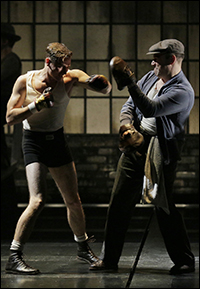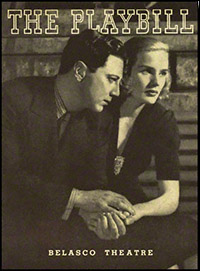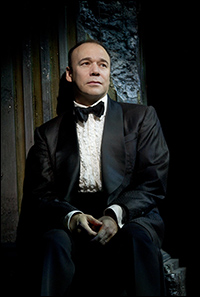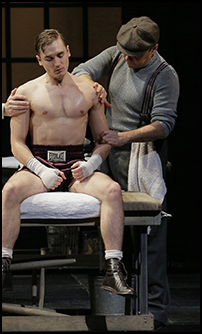
*
Danny Burstein is back on Broadway these days, in Lincoln Center Theater's revival of Golden Boy. It's playing at the Belasco Theatre, where the classic Clifford Odets drama premiered 75 years ago this month.
Burstein, 48, has garnered three Tony nominations in his last four Broadway appearances — as Buddy Plummer in Follies (2012), Luther Billis in South Pacific (2008) and Aldolpho in The Drowsy Chaperone (2006). His other Broadway credits include Women on the Verge of a Nervous Breakdown (2010), A Class Act (2001) and Titanic (1997). He is married to the Broadway musical star Rebecca Luker.
In Golden Boy, Seth Numrich — who searched for the beloved title character in Lincoln Center Theater's War Horse — has the title role of Joe Bonaparte, who gives up the violin for what he hopes will be a lucrative a career as a boxer in Depression-era America. Tony Shalhoub, TV's "Monk," is Joe's father, who has had different dreams for his difficult son. Burstein portrays Tokio, Joe's ring trainer. The director is Bartlett Sher, who helmed South Pacific for Lincoln Center Theater, as well as its highly praised 2006 revival of Odets' Awake and Sing!
Burstein talked to Playbill.com about the play, Burstein's role, his past and his future. Thanks for taking the time to talk with me. I know how busy it is for you, with rehearsals in the morning and afternoon and previews at night. Tell me about Golden Boy — what's your view of the play, and what it says. And why you wanted to do it.
Danny Burstein: One reason I wanted to do it was I'm a huge Clifford Odets fan. I really think he's New York City's Shakespeare. He was brilliant. The language is poetic and beautiful and heightened, and to be able to make it seem natural and just pour out of your mouth is always a challenge. When it does come out beautifully and right, there's nothing quite like it. For me, growing up in New York City, I've heard people speak like this my whole life. But Odets was the only one writing like this.
And the play itself — it's a beautiful New York morality play. It poses many questions that are very important for today's society. We just went through an election where half the country was voting basically for finances, and the other half was saying we should all just help each other. The play raises questions about what it means to be a success in today's society. Is it just that you've made a lot of money, or is success more than that? Is it something intrinsic, and based in morality and love and the arts and things like that? So Golden Boy is unbelievably significant, even 75 years later.
So you obviously think it's relevant today.
DB: Absolutely. Joe struggles, trying to decide what's most important in his life, something deep inside, his love of music, versus his wanting to be rich and famous. He's not sure he can have genuine happiness with either, but I think — I don't want to give too much away for the people who haven't seen it — but he obviously makes the wrong choice, or he makes the choice too late, and that's why it's a morality play.
 |
||
| Seth Numrich and Burstein in Golden Boy. |
||
| Photo by Paul Kolnik |
DB: He's Joe Bonaparte's trainer. He sees a lot of potential in Joe, not just as a boxer but as a human being. He becomes sort of a father figure to him. He's sort of a cross between Rocky and Yoda — an intelligent boxing trainer, but also this wonderful father figure. He has a special affinity for Joe. He sees him as a son. He tries to guide him, not just in the ring but outside the ring, to be a better person and to make the right choices, not just for his boxing self but for his soul. Your character has an unusual name — do you see any significance in it?
DB: There are many things I could have made up, but I think it's probably taken from TKO, technical knockout, from that acronym. They made a name out of it, probably when he was a boxer.
The original cast, way back in 1937, when Golden Boy was performed by the legendary Group Theatre, was filled with icons of theatre history — Luther Adler was Joe, Morris Carnovsky was his father, and the rest of the glorious cast included Lee J. Cobb, Jules (later John) Garfield, Frances Farmer, Elia Kazan and Robert Lewis. (Tokio was Art Smith, who had many supporting roles in film noir in the 1940s, was later blacklisted and went on to play Doc in the original West Side Story in 1957.) Did you and the rest of the cast think about that, or feel anything about the footsteps you're following in?
 |
||
| Playbill cover from the original Broadway production |
DB: Absolutely not — no, I'm kidding! We think about it all the time. This is the theatre where the show premiered 75 years ago. In the basement — there's a very deep two-floor basement underneath the stage, there's just nothing there, it's a huge empty space. It was built by Belasco so Houdini could do his famous elephant trick, where the elephant would disappear. It would drop down two levels. That big enormous space is still there. It's where the Group Theatre used to have their meetings. So if the walls could talk — that cast is all here, in a way, supporting us. At least I hope they are. It has very special significance to us. We actually listened to a recording of the 1937 production, made about six months into the run. Listening to it, and listening to their voices, and the New York cadences. I was listening specifically to Art Smith, who played Tokio. I was trying to steal everything I could, and then I tried to make it my own.
Yeah, those guys hopefully live on through us, and we don't take anything they did for granted. We always go back to their notes, and the original text. We treat them with great respect.
Is acting Odets different from other playwrights?
DB: For me, whatever the genre I'm doing, whether it be a musical, or Shakespeare, or Odets, or Neil Simon, I always try to approach it from a real place. That's the way I come to the table. I try to make it as real as possible. Even as crazy as Aldolpho was in The Drowsy Chaperone, I understood who that guy was. You try to find out what the parameters of the game are when you come to the table, and then you try to push the envelope as much as possible, and play with it inside that particular box that the director has set up for you. So to me, I think it's all about honesty, no matter what the project is.
 |
||
| Burstein in the recent Broadway revival of Follies. |
||
| Photo by Joan Marcus |
DB: I never did. I wish I had, but the guy I was covering [David Aaron Baker] didn't miss. Good for him. I mean it. That's really wonderful. But it did give me the opportunity during the whole rehearsal process to watch and get to know and become friends with Eli Wallach and Anne Jackson. Just watching them in rehearsal and watching them in performance every day was a gift to me that I can never repay. The only thing I can try and do is pass it on to somebody else someday. Learning about simplicity and honesty. Those kinds of lessons are invaluable to any actor. I've always been in these productions — this is the way I grew up in the business — where I was the only guy in the room I'd never heard of. There were always these wonderful, brilliant actors that I worked with — Jim Dale and John Cullum and Jon Voigt and Lynn Redgrave. I was very happy doing my small role or understudying and being a fly on the wall and listening and learning as much as I could.
You're more known these days for your musical portrayals. What made you decide to take on a role in a drama?
DB: I've always been an actor who has done straight plays. I sort of got on a roll there with musicals, and it's very easy in the business for people to pigeonhole you, to say, "Well, you're good at this, but you're only good at this." I thought it was time, especially now, to make sure I did something for my heart and soul, and I felt like doing a play again. I felt like I had done several musicals in a row, and that they were a lot of fun, but I had originally started out as a dramatic actor.
Musicals chose me. It was a good way to make a living, and it still is, and I love them very much, but I also love plays — dramatic plays — and I wanted to stretch those muscles again. I hadn't played dramatic roles on the stage in a while. And I think I chose right here.
How is a play different? And is it more difficult?
DB: Every time I talk to actors who only do musicals, or who only do plays, the grass is always greener. Each one wants to do the other. It's so funny. All my friends who do plays are going, "God, I would love to do a musical." All the people who do musicals say, "I'd love to do a play." I find each has its own particular challenge. There's a great release and fun and strength that it takes to do a musical, but there is also great concentration and real chops that it takes to do a play. Each is a slightly different animal, but both are challenging.
I make that choice to go out of my way to play different characters and do different kinds of roles so I don't get stale. I don't want to do roles that I've done before, the types of roles I could get into a rut playing. Literally after Drowsy Chaperone people were calling and saying they had the role of a funny Latin character. And after South Pacific I was getting offers for scampish New York kind of guys who were funny. I felt like I'd done that and so I wanted to try different things. And that's part of the great thing I've been able to do. I've gotten to a certain place in my career where I'm able to do that. It wasn't always the case.
 |
||
| Seth Numrich and Burstein in Golden Boy. |
||
| Photo by Paul Kolnik |
DB: I was born in Mount Kisco, NY — we were living in the Bronx, but that's where I decided to come out. My parents were divorcing when I was born, and by the time I was two months old they had split. My mom raised me alone until I was about six. She was Costa Rican, so Spanish is my first language. Then my stepfather, Harvey Burstein, came along and basically changed my life. He was a writer and philosophy professor, and he got me interested in plays and reading books, and that started me off. He gave me many plays. It was very funny — I was like an eight-year-old kid reading Ibsen, reading The Wild Duck. I loved it. I understood the dramatic form. It spoke to me, to my heart, more than any other form of writing.
When I was 13 I was lucky enough to audition for the High School of Performing Arts. Over 4,000 kids auditioned that year, and 128 made it in. So from ages 14 to 18 I was at that high school, [which was then] on West 46th Street right in the middle of the theatre district, and it changed my life. All of a sudden, from loving plays, I had this idea that maybe I could be an actor and actually make a living at it.
I got my bachelor's degree from Queens College, where I studied with a fellow named Ed Greenberg, another person who was very important and changed my life. He ran the St. Louis Muny [theatre], which [calls itself] the largest outdoor theatre in the country, and he gave me my Equity card when I was 19. I started doing musicals out there. All the time I'd been doing community theatre and things like that, trying to make it as an actor.
I always worked. I was never lacking for work. But I hadn't made an impression on the people in the business yet. Finally, that came along really in The Drowsy Chaperone, when I played Aldolpho. That show really changed my life.
Is there anything on the horizon for you after Golden Boy?
DB: Another play. I'll be doing double duty starting Jan. 8. I'm doing Roundabout's revival of Lanford Wilson's Talley's Folly, with Sarah Paulson. Jan. 8 is when rehearsals begin. Golden Boy is scheduled to run until Jan. 20, and Talley's Folly's previews start on Feb. 8. [It opens March 5 at the Roundabout Theatre Company's Laura Pels Theatre, Off-Broadway.]
Read the Playbill magazine feature about young actor Seth Numrich, who plays the title character in Golden Boy.









